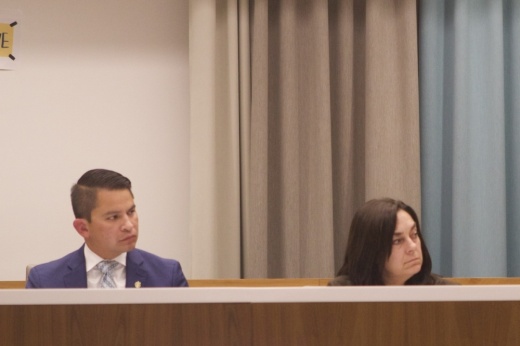The board of trustees voted to approve the proposal by a vote of 8-1 with board Vice President Kevin Foster voting against.
The gist
A monitor, which is a step down from a conservatorship, will be appointed by the TEA, sit in on board meetings and report on the district’s progress.
By agreeing to this proposal, the district also agreed to Lone Star Governance training for the board of trustees and superintendent. This training will “provide coaching and support to improve student outcomes,” according to the TEA.
The district will enter into an agreement with the Council of Great City Schools to be provided with a Lone Star Governance coach, who will provide training and evaluations to the board that fulfill the requirements of the TEA agreement. For a two-year professional services agreement, it will cost the district over $20,000.
Overall, the agreement requires the district to:
- Allow a monitor appointed by the TEA to sit in on board meetings and report on the district’s progress
- Require the board and superintendent to attend Lone Star Governance training, which includes the hiring of a Lone Star Governance coach
- Dedicate 50% of future board meeting time to discussing student outcomes and update special education policies and procedures, not including executive sessions, calculated on rolling three-month time periods
- Complete all outstanding evaluations and meet other deadlines and requirements established by the TEA with a 10-day grace period allowing AISD to address concerns from the TEA
Few community members who provided public comment Sept. 26 approved of the proposal.
“I don't think [the board] should take any sort of deal from [the TEA],” Austin High School teacher Elizabeth Clausen said Sept. 26. “We're an independent school district for a reason, and it needs to stay that way in my opinion.”
Before voting to accept the proposal, trustees in favor emphasized agreeing to the proposal is the best option to ensure progress for special education as well as maintaining local control and district values.
“Public schools governed by elected school boards that accept and retain all students are essential to our democracy,” District 4 board member Kathryn Whitley Chu said Sept. 25. “We must preserve this; we must exist; and we must fulfill the promise to provide every student with the opportunity to achieve their full potential.”
Foster, who voted against approving the proposal, said things would not get better for special education students with federal intervention.
“I don't think things are going to get better for children with disabilities, for newcomers, for immigrant students, for the range of kids that we serve,” Foster said Sept. 25. “They're not going to get better because the state or federal levels tells us how to do our work. They can tell us by the laws of the U.S. Constitution, by the laws of the state, the federal government what we need to do, but how to do it should be left to us.”
How we got here
The TEA notified AISD in March that it would seek to implement a conservatorship due to the findings of an investigation of the district’s special education evaluations.
The agency found as of March 20, the district had more than 1,800 special education evaluations overdue, meaning 1,800 students were awaiting potential access to accommodations at school. Additionally, the TEA reported 40 instances of “systemic noncompliance” in which AISD did not meet special education needs in a timely manner, as previously reported by Community Impact.
In April, the district requested the agency make an informal review of the potential conservatorship, which would place a state-appointed conservator to direct actions within the district’s area of need. This is not a takeover, like Houston ISD is experiencing, in which the elected school board’s power is suspended and given to a state-appointed board instead.
Taking one step down, a monitor was offered to the district Aug. 30 after the informal review by the TEA. On Sept. 25, additional changes were made to the deal, which included the 10-day grace period and a decrease of time in board meetings dedicated to student outcomes and special education updates.
AISD officials said since March, the district has made strides to regards to special education, which include:
- Pending evaluations have decreased by over 40% since January.
- Evaluation staff has increased from 22 to 74 licensed specialists in school psychology and diagnosticians.
- School staff completed two days of special education professional development last spring in preparation for additional training over the summer.
- Fifty additional special education staff were onboarded to accommodate students needing services.
- The special education budget was increased by $30.2 million for a total district investment of $156 million.
- Eighty percent more students were tested this summer compared to summer 2022.
If AISD is unable to fulfill any of the terms in the agreement, the district then waives any right to a petition of review from the State Office of Administrative Hearings, and the TEA may appoint a conservator instead.
“I don't feel we're giving up anything by giving up our right to appeal because we are currently in a situation where the commissioner could put the conservator here anyhow,” District 7 board member David Kauffman said Sept. 25.
The full proposal can be viewed here. For more information, visit www.austinisd.org.





